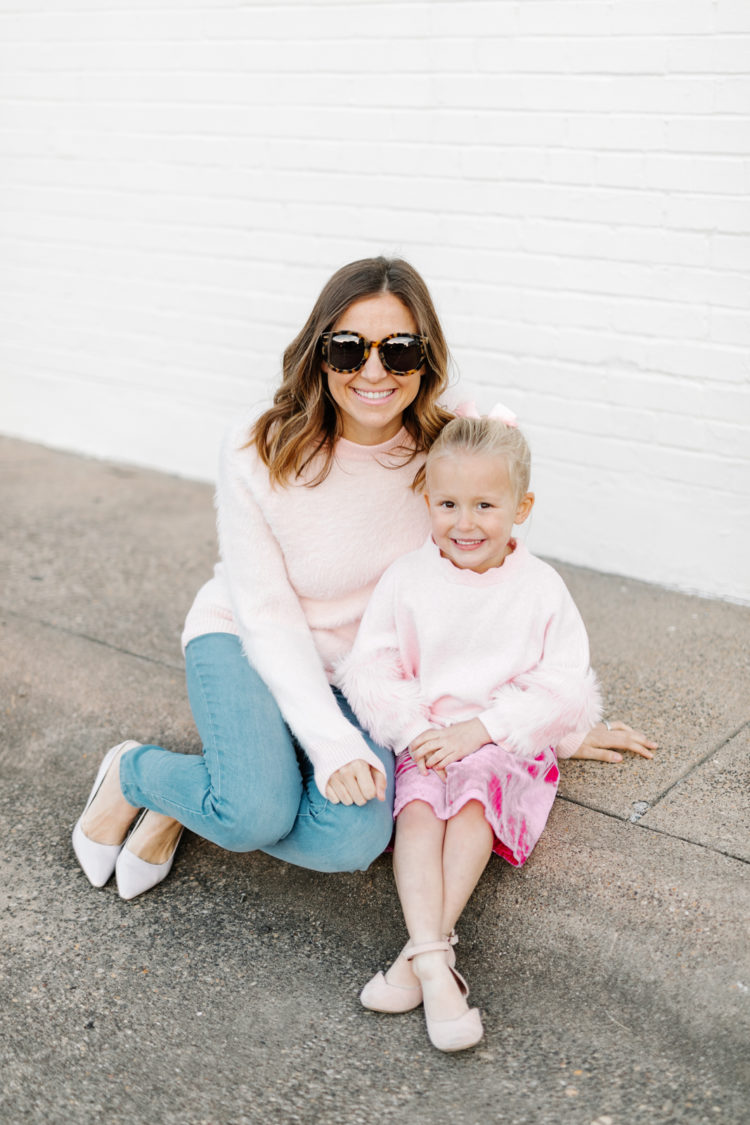
Happy Tiny Tuesday! Today’s post is a fun one for me because I get to put on my speech therapist hat. I have written several speech related posts over the last couple of years, but thought we may be due for another! Since my kiddos are 2 and 4, we spend a lot of our time with mommies that have kids those same ages. And, as our kids get older, it’s only natural that we start to pay closer attention to their speech. Lately, I’ve had a lot of questions about three things: the /r/ sound, lisps, and stuttering. Those are such legitimate questions and so I thought I would touch on each one today.
If you’ve been asking questions about your little one’s speech, that’s good! You are your little one’s biggest advocate, so you should be questioning things all the time. But, I do hope with today’s post that I can give you a little peace and hopefully decrease your worrying. That being said, if you feel like your child’s speech needs a formal evaluation after reading today’s post, please reach out to me. It is never, ever a both for me to answer speech-related questions. It’s what I went to school for and I am a huge advocate for early intervention!
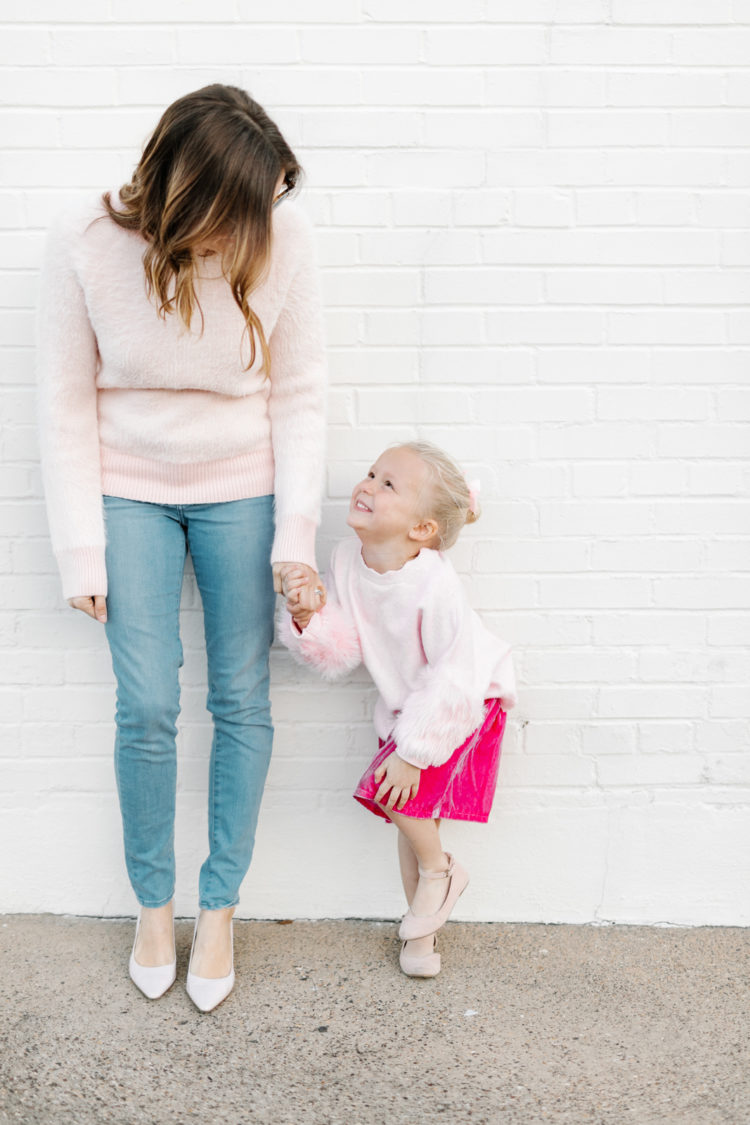
Before I go into any of the topics above – the /r/ sound, lisps, and stuttering, we need to chat about hearing. One of the best things you can do for your child is have their hearing tested yearly. This is so important, because you want to make sure your child can actually hear all the sounds. If your child cannot hear all the sounds, it can significantly impact her (I’m going to use female pronouns today) speech. For example, at about 9 months we had to take Abby to an ENT. She was having a lot of ear infections and so part of our ENT exam included a hearing test by the audiologist. We ended up getting tubes for Abby and learned she struggled to hear some sounds. Once she got her tubes in her babbling increased significantly, no doubt because she could hear all sounds. So, step one is get your child’s hearing tested if you’re concerned.
If you live in Dallas, we have an amazing ENT that came highly recommended. Email me if you’d like the contact information.
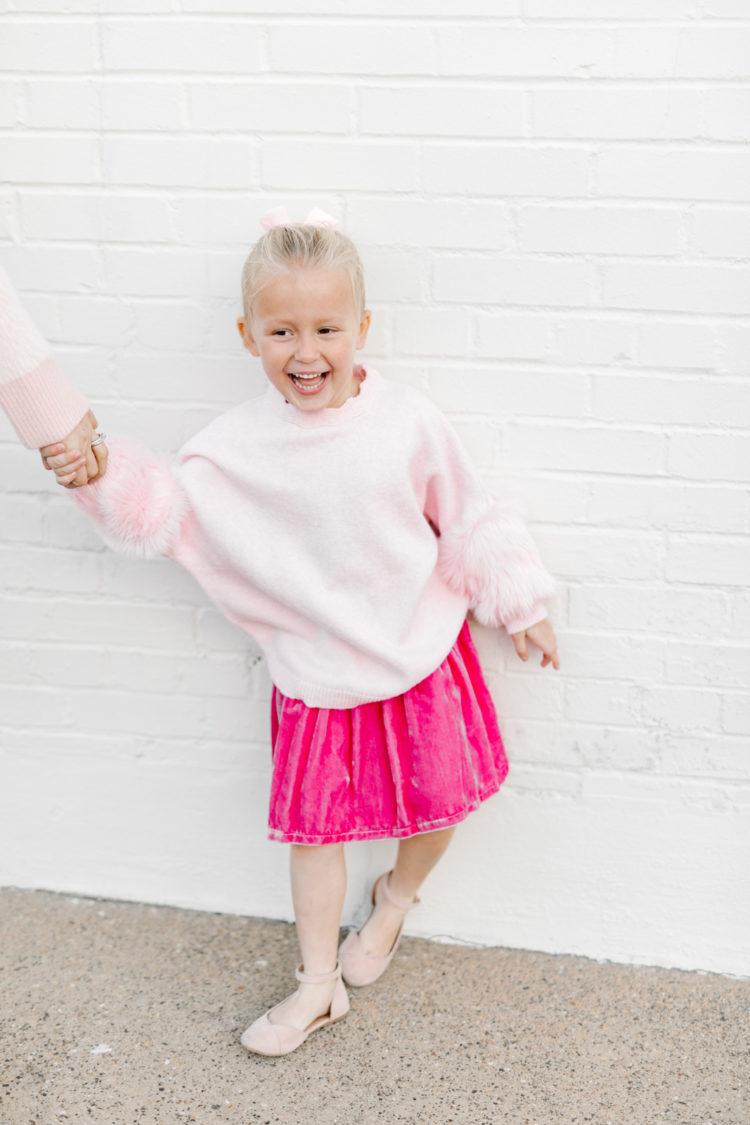
LISPS:
This is one of my favorite speech topics. It’s also one of my favorite things to work on with students and it’s often corrected pretty easily. I feel like lisps often start out “cute” for little kids, but as they get older it loses it’s “cuteness,” right? Abigail actually has a lisp. She’s had it since she started talking and it’s still there. Now, whether it sticks around or decides to fade away, I’m not worried at all. Speech therapy is a great thing and we’ll kick it to the curb one way or the other.
Lisps, or difficulty producing the /s/ sound, are actually very common in small children. For a lot of sounds we can give an age that it should be solidified. However, there is a lot of debate around the /s/ sound and lisps as to when it should be solidified. Some experts say 3 years while others say 3-7 years. I am probably somewhere in the middle. Would I be concerned with a 3 or 4 year old that lisps? It depends, but not typically. Would I have some concern with a kindergartner? Yes. I would probably address it then.
Now, when we’re talking about a lisp though, there are several things you need to take into account. The first is to take note of your child’s anatomy. Is she able to move her tongue? Can she lick her lips? Can she elevate her tongue by imitation? Can she touch the roof of her mouth? These would all lead to the possibility that her lisp is related to her anatomy if she’s unable to do some of those things.
The other thing you want to take into account is your child’s intelligibility. That means, how does your child’s lisp affect your ability to understand she she is saying when she talks? Does your child only struggle to say the /s/ sound correctly, or are there other sounds your child cannot produce? For example, in addition to Abby’s lisp, she also cannot say her /r/s correctly. However, it doesn’t affect her intelligibility. We can still understand everything she’s saying despite saying those two sounds incorrectly. If your child’s intelligibility is significantly affected by her lisp and inability to say other sounds, I would consider seeing a speech therapist for an evaluation.
THE /R/ SOUND:
The dreaded /r/ sound. To give kids credit on this one, the /r/ sound is the absolute hardest sound to produce. Think about it, when you produce the /r/ sound, your tongue is in the middle of your mouth. It’s super hard to explain to kids how to move their mouth to make this sound correctly. The /r/ sound is probably the one sound that most think of in relation to a child having speech difficulty. It’s one of the last sounds to solidify, too, so most parents have a concern about this sound at one point or the other. Emma Grace never had trouble with articulation, but Abby still cannot produce her /r/ sound correctly. Instead it sounds like an /l/ or a /w/.
The /r/ sound doesn’t actually solidify until 7 years of age even though most kids produce it correctly at age 5. It is one of the most important sounds for children to be able to produce however because it’s a high frequency sound in English. That means that the /r/ sound is produced significantly more than other sounds in the English language. So, a child’s inability to produce /r/ correctly can greatly affect a child’s intelligibility.
So what do you do as a parent? When should you be concerned? To answer the latter question first, I wouldn’t be concerned until grade school. As a speech therapist, I sometimes don’t even address the /r/ sound until the child can correctly produce all of her other sounds. And what can you do as a parent? If you have a child 5 years or over that is still struggling with the /r/ sound, I would seek out a speech evaluation. You can often do this via your school, but you can also seek out home health services. And as far as what you do at home, just continue to model good speech. Don’t have your child say /r/ words over and over, just model a good /r/ by correctly producing it in words.
STUTTERING:
“Should I be worried about my child’s stuttering?” is probably the most common speech question I get. Stuttering is typically multifaceted and can have emotional components related to it, so I get the concern. I also get why a lot of people ask because a lot of toddlers do stutter. It’s normal believe it or not. As children become verbal there is often a period where dysfluencies (stuttering) are common. To simplify it, kids have a vocabulary overload. Their verbal expression struggles to keep up with their auditory comprehension. So, they stumble over their words as they try to get it all out as quickly as they can. For example, Emma Grace (age 4) will sometimes get so excited that she’ll repeat a phrase 1, 2, even 4 times over. She’ll say something like “hey mom, today when we…today when we…today when we were outside we played tag.” Totally normal.
So how do you decipher when stuttering is normal and when it’s not? I actually found a great chart from healthychildren.com and dropped it below for you to check out. Stuttering can be and is often normal for young kids, but after the age of 7 it becomes less likely that stuttering will go away completely.
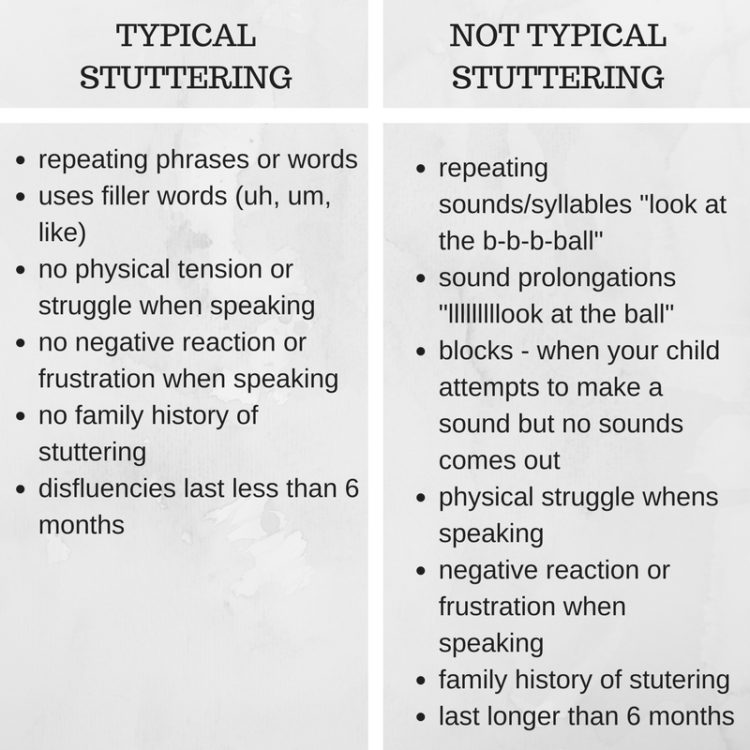
So what can or should you do at home? The best thing you can do is model good speech. Instead of calling your child out or stressing her out by making her say thing again, simply be a good model. You simply state the phrase correctly and move on. Don’t say “listen to me say it” and then say it, just model good speech. For example, if Emma Grace said “let’s go, let’s go, let’s go to the park mommy,” I would reply, “yes, let’s go to the park.”
The other thing you can do is be patient. Give it time and let your child get the phrase out she is trying to say. You can also work to reduce communication stress in your home. And, if your child is old enough to notice her stutter and seems bothered by it, talk to her about it. Finally, go see your pediatrician if you’re worried and they can point you to a qualified SLP for a speech evaluation.

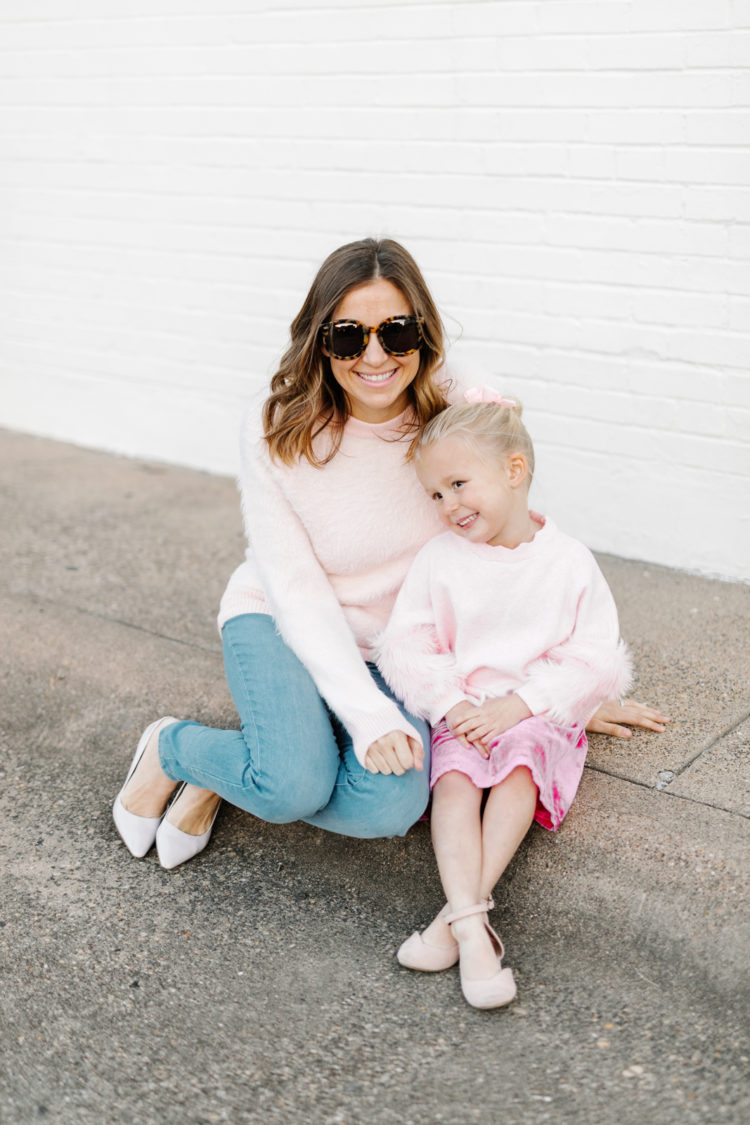
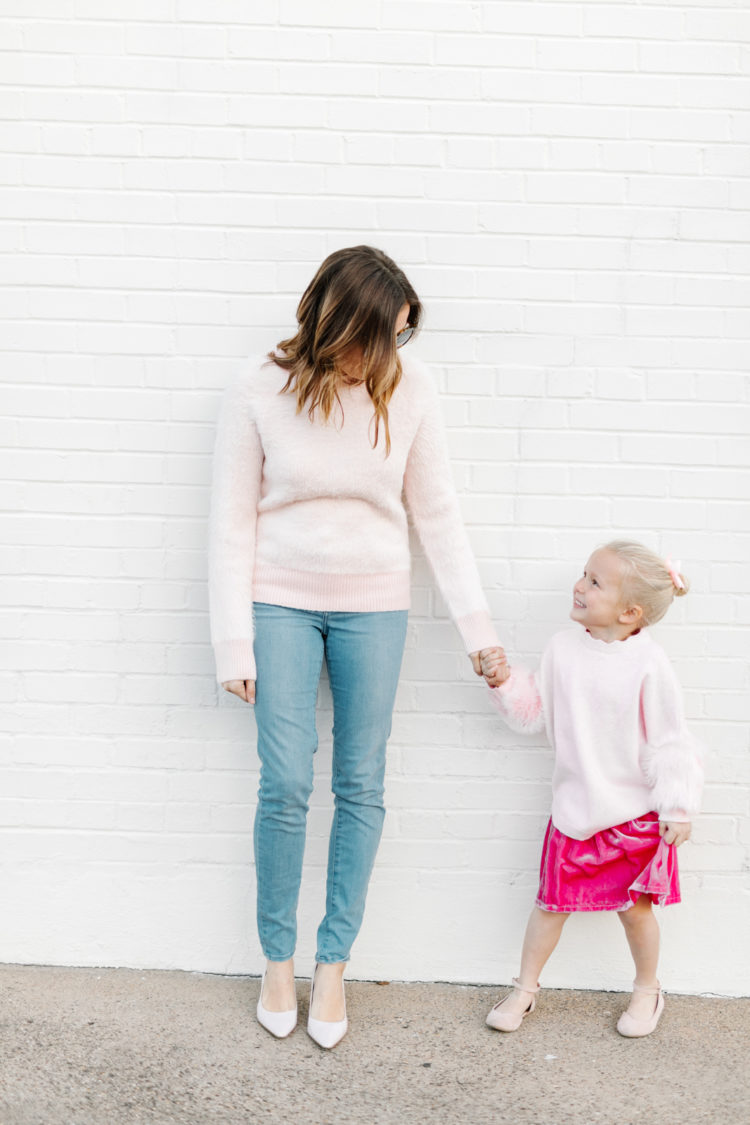
me// sweater: similar, similar | denim: mott & bow | pumps: similar | sunnies: karen walker
emma grace // sweater: target | skirt: target | shoes: old navy
photography: fort lion studio




